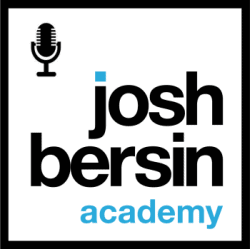Episode Transcript
Speaker 1 00:00:10 Hi everyone. Today I want to tell you the story of digital transformation in the banking and financial services industry. And this is a very, very profound story that is the culmination of roughly a year and a half of research through the Global Workforce Intelligence Project. And let me just say, personally, I am so proud of this research. This is in some sense the pinnacle of my time as an analyst over the last 25 years. Some of the most important research we've done. So the context of course, is for the last roughly 20 years, since the early two thousands, maybe a little bit more, we've been digitizing businesses in many ways. And the original concepts of digital business was putting things into websites and apps. And later it became digitizing services through microservices, new experiences, subscription models, and later things like crypto micropayments and digital media, et cetera.
Speaker 1 00:01:07 And of course, in some sense, the cloud revenue streams from large tech companies are part of this. All of the content businesses like Netflix and Disney have are part of this. E-commerce is part of this. And then of course there's the business of banking. Now, banking is a massive industry. We all need banks to store money for us to loan us money, to give us financial services for the many things we do in our lives. And cash is becoming less and less needed in the economy. So if you consider yourself a bank, which is a regulated entity, you are expected to have reserves and compliance with some pretty important rules. And in exchange for that, you get a trusted status from the federal government and you get protection. And so consumers or businesses use banks because they are a trusted source of financial services. Obviously crypto is not, at least at this point, based on what just happened.
Speaker 1 00:02:05 Well, banks have been around a long time. When I worked at IBM in the 1980s, we worked with Bank of America when they were located in San Francisco and they were a complete mainframe shop, and I'm sure those mainframes are still there. And each mainframe application ran a complex, highly configured, highly customized set of financial applications for a part of the bank, the mortgage system, the brokerage system, the small business loans, the checking accounts, the credit accounts, whatever they may be. I don't know. All of them all had systems built on mainframes. And we consumed those products and services by going into a branch or calling somebody on the phone and then buying them. And so they set up large networks of tellers later ATMs, by the way, I remember when the ATM was a revolutionary idea and we thought that branches were gonna disappear, but they didn't because people want to go in and talk to people in banks, they wanna get sold stuff, they wanna know what's new.
Speaker 1 00:03:01 They want to come home with their free toaster <laugh>. And so banks adapted to this more online model, but it was still mainframe based. Well along comes MasterCard competing with cash Visa, competing with cash. Buy now, pay later companies. Apple gets into payments, Google gets into payments. Microsoft probably will get into payments. Walmart decides they wanna offer financial services. Amazon decides they wanna offer financial services. These are not regulated banks, but they appeal to consumers nevertheless. And consumers are buying products from them maybe not knowing that they're not that well protected, but liking the fact that they're easy to do business with and they don't have to go into a branch and talk to an untrained teller to get something done. So the banking industry, which is a regulated industry in the United States and all over the world, has been trying to adapt, but it's been really, really hard.
Speaker 1 00:03:56 Most of the large banks have spent trillions of dollars on it. And the reason it's called it is because the history of the technology part of banks was the data center. And I've been in the data center of banks. That was the most important thing in the banks. Charles Schwab and Bank of America's data center was like Fort Knox. When I was at ibm, the most stressful meetings we ever went to were the weekly or daily meetings of operations at Bank of America. That data center was the nucleus of those banks. Well, now that the products and services are delivered on phones and consumers want an integrated experience across all of these products and services they buy, those mainframe systems are holding the banks back. And the IT departments that run those data centers didn't have jobs like product manager, scrum master, DevOps, agile coach, et cetera, et cetera, et cetera.
Speaker 1 00:04:55 They had operations people that had people that did backups, they had people that did data security. They had people that did performance improvement and performance management, network management, et cetera. But in the new world, the disciplines and roles and jobs that are needed to be a digital product company, which is what these new banks are becoming, are just different jobs. They're just different roles. You need user interface designers. You need real-time data analysts because in a digital bank, you need to know almost instantaneously what people are trying to buy to make sure that the systems are set up and have the capacity to meet the need. So what we did fully understanding this situation, we went into this about a year ago as part of the gwi, and we collected all of the GWI data in eightfold for 200 or so of the largest banks in the world and analyzed all of the skills of all the jobs.
Speaker 1 00:05:47 We clustered the roles into four groups, front office, mid-tier, IT and administration. We looked at the trending up skills, the trending down skills. We looked at the trending up job titles, the trending down job titles. And then we took all of that data and we looked at all of the banks by name, and we compared the really high performing digital best in class banks, and we know who they are. They're called Trailblazer Banks who can read about them in the report. And we compared them against everybody else. And all we basically found was that they don't even look like the same company under the covers. They're very different. So if you are a bank and you're building more digital products and services, and you want to become the new world of internet enabled, fully digital consumer service financial services companies, adding more people to the IT department is gonna get you there very slowly.
Speaker 1 00:06:42 In fact, what we found after looking at the research and talking with other companies, including Deloitte, is that the trailblazer banks are not only far more sophisticated and profitable and growth oriented, they are distancing themselves further and further and further from the traditional banks. Now, banking is a very fragmented market. There will always be a lot of small banks because people want special services in their community and so forth. So it's not like the whole market's gonna disappear, but for the bigger banks, this is an urgent, urgent issue. So what did we discover? Well, you'll have to read the report to get the details, but essentially what we found is first of all, in terms of roles, the trailblazer banks have 30 to 40% more people in these technology and product and digital design and analytics roles. That is a big difference. Where do those people come from?
Speaker 1 00:07:35 They came from the what is often called the middle office in banks. The middle office are all of the people behind the scenes who don't work in a branch or don't talk on the phone, who are pricing mortgages, processing paperwork, processing a new account, et cetera, et cetera, et cetera. And a lot of that has been done manually for many, many years. In fact, my bank, I won't mention the name is not that sophisticated digitally and they're very high net worth, hands-on type of oriented. I've been to the branch and watched them process paperwork, and it reminds me of what used to happen in the 1980s. I mean, I just can't believe how much paperwork they have to fill out to do some simple things, so I don't go in there very often. And so what these advanced or trailblazer banks have done is through this re-engineering of the IT and product operations groups, they have allowed themselves to automate away many of these mid-tier jobs.
Speaker 1 00:08:31 The front office jobs have not changed. If you look at the number of people and the job titles in front office roles between the trailblazers and the non trailblazers, it's not that different. There are some new roles in the trailblazer banks, banking consultants, financial consultants, people that can sell multiple products and services. But those are roles that can be created in a traditional bank too. The second thing you find in these advanced digital banks is the technology skills and the technologies they're using are just different. They're using Kubernetes, they're using agile methodologies, they're using updated technology for mobile, they're using more advanced data management and data science technologies. They have teams working on ai. They have teams working on realtime data monitoring of their websites. They have very sophisticated user interface designers. They do a lot of iterative development with their customers. They also develop those skills internally in a very aggressive way.
Speaker 1 00:09:33 They don't just send people to a course and bring them back. They're constantly developing what we might call digital or cloud capability academies to learn more and more and more about crypto, about security, about consumer behavior. And they really are in some sense digital platform companies that are manifested through a banking relationship and a banking license, not banks that have implemented advanced digital it. The advanced ones, one of the ones I visited, I mean I've visited many of them. Digital Bank of Singapore DBS is actually a pretty old bank. It used to be a government owned bank. And if you read the history of dbs, DBS was a fairly slow moving government entity I believe, and went gotten into some big financial problems. And the new CEO came in and said, we're gonna change everything around here. We're gonna do agile, we're gonna be digital, we're gonna build products and services you've never seen before.
Speaker 1 00:10:33 And if you meet the people at DBS and you look at what they've done, it'll blow your mind. And we have a really detailed case study on dbs and they will be speaking at our conference in June. Another bank that we consider our Trailblazer Bank is I N G I N G is located in the Netherlands where I was a couple weeks ago. They have the Orange brand as do a lot of things in the Netherlands. And they were also forged and really developed our digital strategy because of some of the really poor regulatory compliance they had, might have been in the 1990s, I forget what year it was. And they really decide they were gonna go all agile. When I wandered around I N G the last time I was there, I noticed that everything is agile. The HR department is agile, so they've embraced agile methodologies and agile tools to a large degree.
Speaker 1 00:11:19 I actually sat next to the chief economist at I N G when I was at the meeting I was at with the king and queen, and we talked about this. They are a real time bank and they try to make decisions in real time on all of the financial products and services and pricing and interest rates that they do. And there are others on the list that we consider trailblazers. Robo bank is one. We actually consider Bank of America a trailblazer, by the way, even though Bank of America's probably got plenty of old systems hanging around, so, so anyway, I'm not gonna try to give you the whole story, but this is what it's about. Now, the reason I want to do a podcast on this, this is three or four things. First of all, this story really points out why the Gwi research is so important.
Speaker 1 00:12:01 Every company is going through some form of transformation to become more digital and more aligned to some new business model or some new industry than before. I have a good friend who works in the EV industry. He used to work for Tesla, then he worked for Rivian, he is now working for another company and he built with his team all of the consumer facing sales and service platforms for these companies. Imagine what that's like. That is not automobile engineering. That is digital product and service engineering and all of the configurations and interfaces to the manufacturing system and service related systems that have to be involved in that. These new EV companies are digital product and services companies also, and I think this is true for Walmart, this is true for Amazon, this is true for Target. This is through true for telecommunications companies like Verizon and at and t, everywhere.
Speaker 1 00:12:54 So this idea that what got you to where you were will not get you to where you're going is a very important idea. And we are in a position to show you if you're in banking or healthcare, the two industries we've done so far, exactly what the things are that you should inspect and the goals that you should set yourself to change. The second thing I want to point out is that the Trailblazer banks are very focused on culture and employee development and employee engagement and employee empowerment and employee mobility, believe it or not, all that HR stuff that we talk about day after day that I constantly blab about on these podcasts isn't really HR stuff, it's really business enablement. And for the banking industry, which is going through a very, in some sense, it's being redefined. It's not really transforming, it's being redefined in some sense.
Speaker 1 00:13:44 If the people are not gonna come along, you're not gonna get there from here. And let me tell you what this means for banks. Most of the banks that Stella talked to told her things like, we hire all these hotshot engineers and they leave after three months. Or they don't just, they don't wanna work for us, they don't even apply. We get the grade B, grade C, grade D engineers. We never get the Grade A engineers, they wanna go work in electric vehicles or they wanna go work for Google or Microsoft or something. They don't wanna come here. So if you don't build the right culture, the right management team, the right focus on development, the right focus on advanced technology, focus on innovation, you're not gonna attract these people. And that's why the Trailblazer Banks are accelerating their lead over the traditional banks. They're getting the top people.
Speaker 1 00:14:32 And of course if you get the Bs and Cs, the Bs and Cs hire the Cs and Ds. So it's a very kind of a death spiral when you can't get good people in these new areas. So you either have to hire them or you have to develop them. And that's all about culture and all the things we do in hr. Okay, let me stop there. There. I just wanted you to know that if you're not in a bank, you should still look at some of the stuff in that research because it will teach you a lot about some of the things you need to do in your company. And if you are in the banking or financial services industry, we would welcome you as a corporate member and we will be happy to put together a plan to benchmark you against this data set.
Speaker 1 00:15:11 If that's something you'd like to do. The next big Gwi research coming will be probably Q2 of next year and consumer products. It will also be fascinating. Have a great holiday. I know I'll probably do maybe one more podcast before the end. I have finished writing my predictions for next year. It will be very interesting. Won't be available till January. We are taking the next two weeks off over here though. I'll be around and I wish you all a fantastic holiday and get some rest and have a wonderful time with your friends and family. Thank.


